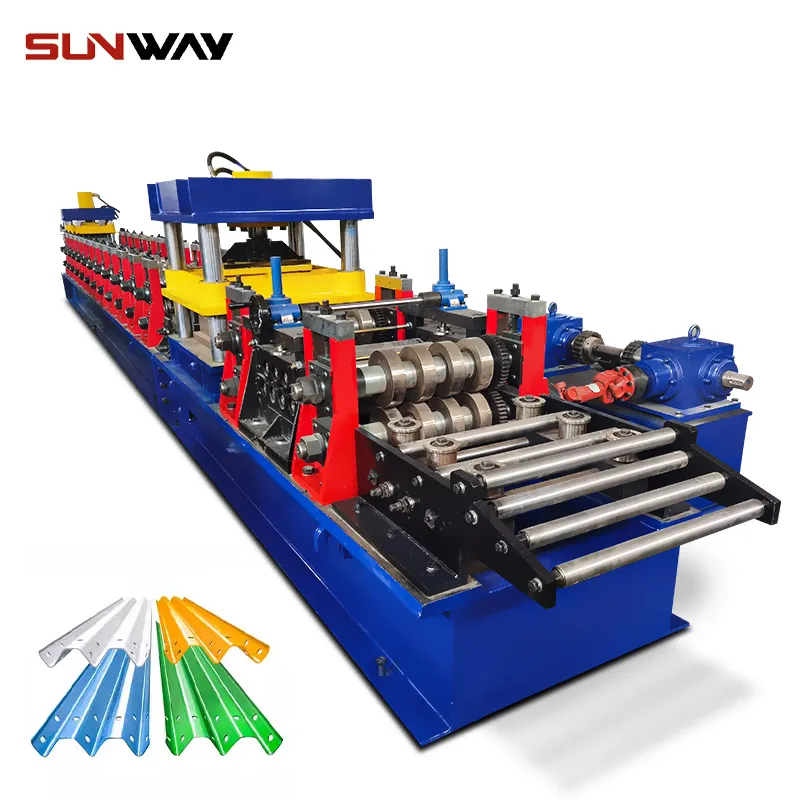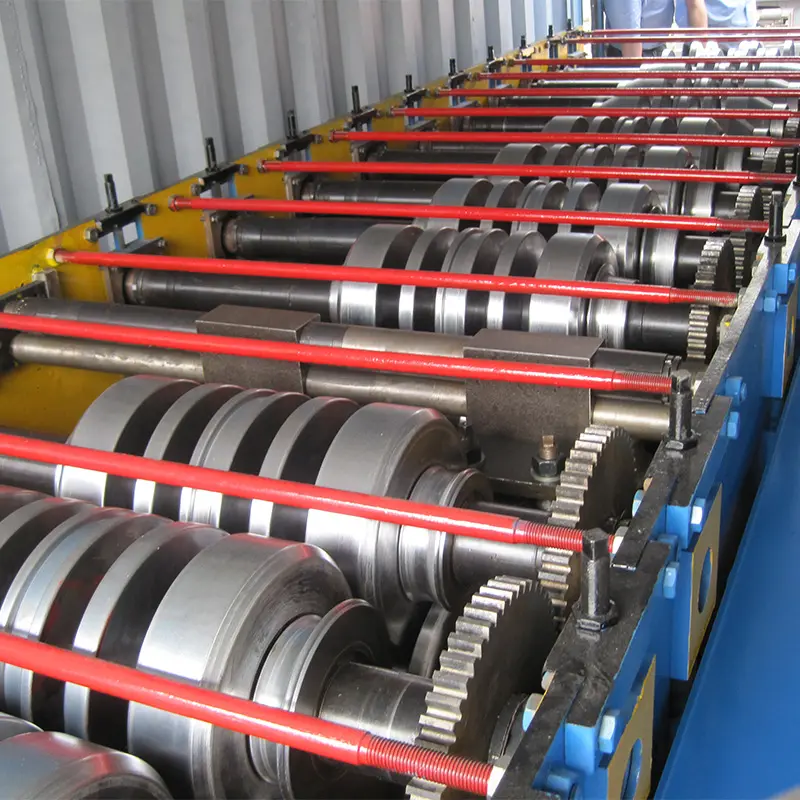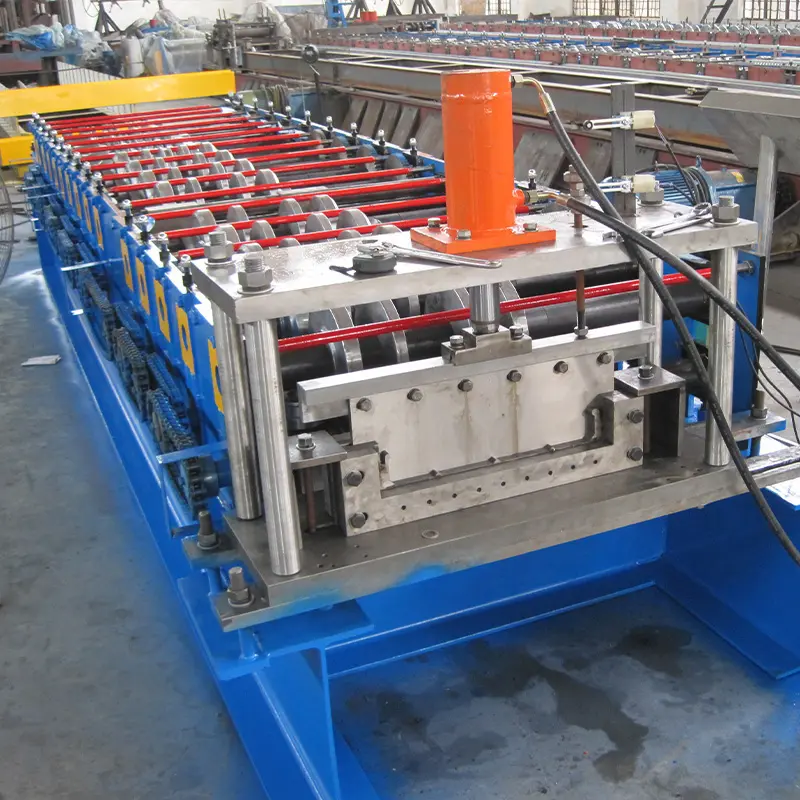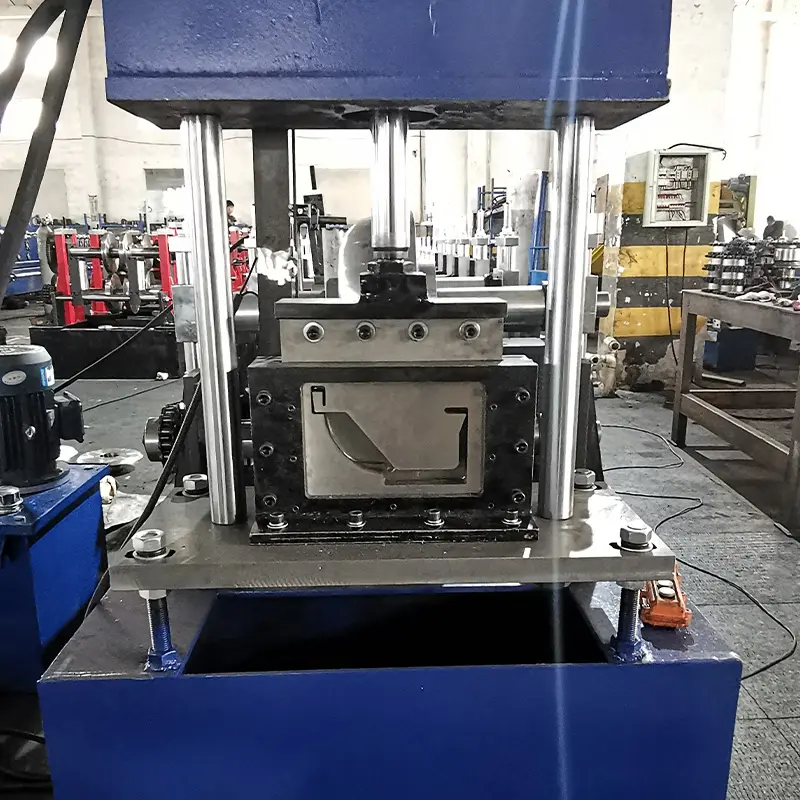परिचय
In the fast-paced world of construction, efficiency, precision, and speed are crucial elements for success. The advent of roll forming technology has significantly impacted the building industry, making it possible to produce high-quality wall panels with ease. In this article, we will explore the world of wall panel roll forming machines, their advantages, working mechanisms, and the various types of wall panels they can produce.
What is a Wall Panel Roll Forming Machine?
A wall panel roll forming machine is an advanced piece of equipment used in the manufacturing process of wall panels for residential, commercial, and industrial buildings. It employs a continuous bending process to shape metal coils into specific profiles and lengths. These machines play a vital role in modern construction by providing a cost-effective and efficient way to produce durable wall panels.

Advantages of Wall Panel Roll Forming Machines
बढ़ी हुई दक्षता और उत्पादकता
The roll forming process allows for continuous production, reducing downtime and increasing productivity. With minimal manual intervention, the machine can produce a large number of wall panels in a short period.
定制选项
Wall panel roll forming machines offer flexibility in design, allowing manufacturers to create customized profiles according to their clients' requirements. This adaptability provides architects and builders with a wide array of design choices.
Cost Savings
Compared to traditional manufacturing methods, roll forming significantly reduces labor costs and material waste. The automated process ensures precise dimensions, minimizing the need for excess materials.
耐用性和强度
The wall panels produced by roll forming machines exhibit superior strength and durability due to the consistent forming process. They can withstand harsh weather conditions and offer long-lasting performance.
Reduced Material Waste
Roll forming machines optimize material usage, resulting in minimal waste. This not only benefits the environment but also contributes to cost savings for manufacturers.
How Does a Wall Panel Roll Forming Machine Work?
The roll forming process involves several stages that transform raw materials into finished wall panels.
सामग्री खिलाना
The process begins with feeding metal coils, typically steel or aluminum, into the machine. The material is guided through rollers and leveling equipment to ensure a smooth and even surface.
辊压工艺
The heart of the machine lies in the roll forming stations. Here, a series of rollers gradually shape the material into the desired wall panel profile. Each station corresponds to a specific part of the panel profile.
कटिंग और शीयरिंग
Once the panel reaches the required length, the roll forming machine cuts it using a flying shear or a stationary shear. This ensures precise and accurate panel lengths.
स्टैकिंग और पैकेजिंग
The finished wall panels are then stacked and packaged, ready for transportation and installation.

Types of Wall Panels Produced by Roll Forming Machines
Wall panel roll forming machines can produce a wide variety of panels to suit different building needs.
Corrugated Wall Panels
Corrugated wall panels are commonly used in agricultural and industrial buildings. The characteristic ridges add strength and stiffness to the panels, making them ideal for heavy-duty applications.
Insulated Wall Panels
Insulated wall panels feature a core material sandwiched between two metal layers. These panels offer excellent thermal insulation and are commonly used in energy-efficient buildings.
Standing Seam Wall Panels
Standing seam wall panels have raised seams that interlock to provide a clean and modern aesthetic. They are widely used in commercial and residential projects.
Ribbed Wall Panels
Ribbed wall panels are known for their strength and versatility. They are commonly used in roofing and siding applications.
Considerations for Choosing a Wall Panel Roll Forming Machine
Investing in a wall panel roll forming machine requires careful consideration to ensure the right fit for your manufacturing needs.
सामग्री संगतता
Choose a machine that is compatible with the type of material you plan to use for your wall panels. Different machines may be designed for specific materials like steel, aluminum, or other alloys.
Machine Size and Capacity
Evaluate your production requirements and select a machine with the appropriate size and capacity to meet your output demands.
Automation and Technology
Modern roll forming machines come with advanced automation features and integrated technology. Consider machines with user-friendly interfaces and data collection capabilities for process optimization.
Maintenance and Support
Look for machines from reputable manufacturers that offer reliable customer support and maintenance services to keep your production running smoothly.
Setting Up a Wall Panel Manufacturing Business
Starting a wall panel manufacturing business involves several crucial steps.
Market Research and Target Audience
Conduct thorough market research to identify potential customers and understand their needs. Define your target audience and tailor your product offerings accordingly.
Selecting the Right Machine
Choose a wall panel roll forming machine that aligns with your business goals and production requirements.
Factory Setup and Space Requirements
Set up a well-organized factory space with adequate room for the roll forming machine, material storage, and other equipment.
Staffing and Training
Hire skilled operators and provide them with comprehensive training on machine operation and safety protocols.
Quality Control and Testing
Implement rigorous quality control measures to ensure that your wall panels meet industry standards and customer expectations.

Troubleshooting Common Issues with Roll Forming Machines
Understanding and addressing common problems will help maintain the efficiency of your wall panel roll forming machine.
असमान रोल फॉर्मिंग
Check for misaligned rollers and make adjustments to ensure a uniform forming process.
सामग्री जाम होना
Regularly inspect and clean the material feeding system to prevent jams and disruptions in the production process.
Inconsistent Panel Dimensions
Calibrate the machine regularly to ensure consistent panel dimensions throughout the production run.
Excessive Wear and Tear
Regular maintenance, including lubrication and parts replacement, will extend the lifespan of your machine.
Maintenance Tips for Wall Panel Roll Forming Machines
Proper maintenance is essential to keep your machine in optimal condition.
नियमित सफाई और स्नेहन
Clean the machine regularly to remove debris and apply lubrication to minimize friction and wear.
Inspection and Parts Replacement
Conduct routine inspections and promptly replace any worn or damaged parts.
校准与对中
Ensure the machine is properly calibrated and aligned to maintain precise panel dimensions.
Future Trends in Wall Panel Roll Forming Technology
As technology advances, the roll forming industry is set for exciting developments.
工业4.0集成
Integrating smart technology and data analytics will enable more efficient production processes and predictive maintenance.
Sustainability and Green Manufacturing
Eco-friendly materials and energy-efficient production methods will become increasingly vital in the roll forming industry.
उन्नत सामग्रियां तथा कोटिंग्स
Adopting innovative materials and coatings will enhance the performance and durability of wall panels.

निष्कर्ष
Wall panel roll forming machines have revolutionized the construction industry by providing a cost-effective, efficient, and sustainable solution for producing high-quality wall panels. From customization options to boosted productivity, these machines are transformative for manufacturers and builders alike. Embracing this technology will foster superior construction practices and a more sustainable future.
常见问题解答
Q1: Can I use a wall panel roll forming machine for other profiles?
Yes, although designed specifically for wall panels, these machines can be adapted to produce other profiles with minor adjustments.
Q2: How long does it take to set up a wall panel manufacturing business?
Setup time varies depending on factors such as location, machinery delivery, and training, but it typically takes a few months to become fully operational.
Q3: Can I start a wall panel manufacturing business on a small scale?
Yes, beginning small and scaling up as demand grows is a proven strategy in the manufacturing sector.
Q4: Are roll-formed wall panels as durable as traditional panels?
Roll-formed wall panels are highly durable, capable of withstanding diverse environmental conditions, and—with proper maintenance—offer a lifespan comparable to traditional panels.
Q5: Can I use different materials in one roll forming machine?
This depends on the machine's design and capabilities. Some can handle multiple materials, while others are suited for specific ones only. Always consult the machine's specifications before use.
Frequently Asked Questions (FAQ)
1) What metals and coatings work best for wall panel roll forming machines?
- Galvanized steel (ASTM A653 G90/Z275), Galvalume/Al-Zn (AZ50–AZ55), pre-painted coils (PE, SMP, PVDF), and aluminum 3003/3105 H14 are common. For coastal or industrial sites, Zn-Al-Mg (e.g., ZM250–310) improves corrosion resistance.
2) How do insulated wall panels (sandwich) integrate with roll forming lines?
- The face sheets are roll-formed inline; foam (PIR/PUR) or mineral wool is added via a continuous laminating section. Critical controls are sheet tension, adhesive application, and synchronized curing to avoid panel camber and delamination.
3) What determines the maximum line speed for wall panel production?
- Material thickness/grade, profile complexity (deep ribs/standing seam), punching patterns, cutoff type (servo flying shear vs. stop-cut), and decoiler/stacker throughput. Typical 2025 ranges: 20–60 m/min for single-skin panels; 6–18 m/min for insulated panels.
4) How can I reduce oil-canning on architectural wall panels?
- Improve entry leveling (6–9 roll leveler), use tension leveling coils, optimize flower design for balanced strain, specify thicker gauge or higher temper, and consider micro-ribbing/bead stiffeners to dissipate waviness.
5) What certifications or standards should wall panel lines and products reference?
- Machinery safety: ISO 12100, ISO 13849-1, IEC 60204-1; product/material: ASTM A653/EN 10346, ASTM E1592 (wind uplift), EN 508-1 for metal sheets, fire performance for insulated panels: EN 13501-1, FM 4880/4881/4471, NFPA 285 (assemblies).
2025 Industry Trends for Wall Panel Roll Forming Machines
- Smart lines with closed-loop vision: Inline laser/vision measures rib height, seam fit-up, and hole positions, auto-correcting stand positions and punch X/Y to cut first-article scrap to ~1–2%.
- Growth of insulated metal panels (IMPs): Demand driven by net-zero codes, cold-chain, and data centers; more lines add continuous lamination and edge-trimming modules.
- Faster changeovers: Servo-positioned stands and recipe-driven tooling reduce profile change time to 5–12 minutes, boosting OEE.
- Energy and sustainability: Regen drives and smart-idle reduce kWh/ton; shift toward Zn-Al-Mg coatings and higher recycled content coils.
- BIM and traceability: Datamatrix/QR panel marking tied to coil heat, coating, and panel geometry for clash-free installation and warranty tracking.
- Safety by design: Category 3/PL d safety, interlocked guards, light curtains at stackers, and predictive maintenance on bearings/gearboxes.
2025 Benchmarks and KPIs (Wall Panel Lines)
| KPI | 2023 Typical | 2025 Best-in-Class | Notes/Enablers | Sources |
|---|---|---|---|---|
| Line speed (single-skin, 0.5–0.7 mm) | 25–40 m/min | 45–60 m/min | Low-inertia stands, servo flying shear | FMA; The Fabricator |
| Line speed (IMP continuous) | 8–12 m/min | 12–18 m/min | Advanced foaming/curing control | EIMA; IMP Alliance |
| Changeover time (profile recipe) | 25–60 min | 5–12 min | Servo stand positioning, HMI recipes | OEM datasheets |
| First-article scrap | 3–6% | 1–2% | Inline vision and digital pass design | data M; UBECO |
| Energy intensity (kWh/ton) | 95–130 | 75–100 | VFDs, regen, smart idle | U.S. DOE AMO |
| Share of Zn-Al-Mg coils in façade work | ~20–30% | 35–50% | Corrosion performance | Eurofer; industry reports |
Authoritative references:
- ASTM A653/A792 materials: https://www.astm.org
- AISI/CFSEI design resources: https://www.buildusingsteel.org
- Eurocode EN 1993 and EN 508-1: https://standards.iteh.ai
- FMA Roll Forming: https://www.fmamfg.org
- The Fabricator (roll forming insights): https://www.thefabricator.com
- U.S. DOE AMO (energy benchmarks): https://www.energy.gov/eere/amo/advanced-manufacturing
- Insulated Metal Panel Alliance (IMPA): https://www.impalliance.org
Latest Research Cases
Case Study 1: Vision-Guided Wall Panel Line Cuts Oil-Canning Claims (2025)
- Background: An architectural façade fabricator had high warranty claims due to oil-canning on flat/ribbed wall panels for premium retail projects.
- Solution: Added 7-roll precision leveler, inline laser rib-height measurement, and camera-based flatness scoring; updated pass design and introduced micro-bead stiffening option.
- Results: Visible waviness complaints reduced by 58% YoY; first-article scrap 5.2% → 1.9%; achieved rib-height CpK 1.45; installation rework time down 22%.
Case Study 2: IMP Line Retrofit for Net-Zero Warehouse Program (2024)
- Background: Logistics developer required higher R-values and faster throughput for refrigerated and ambient warehouses.
- Solution: Retrofitted continuous laminator with tighter temperature/ratio control for PIR foam, upgraded servo flying shear and automatic edge trim/stacker; implemented QR traceability to BIM.
- Results: Throughput +32% (to 15 m/min); panel R-value +18% with stable density; NCRs down 40%; average installation time per bay -12% due to traceable panel mapping.
Expert Opinions
- Dr. Sarah McAllister, Director of Building Envelopes, Oak Ridge National Laboratory
- Viewpoint: “For high-performance wall systems, coupling roll-formed skins with PIR or mineral wool cores and verified thermal breaks is essential to meet 2025 code targets without sacrificing speed.”
- Source: https://www.ornl.gov
- Marco León, Head of Product, data M COPRA RF
- Viewpoint: “Digital flower design with automatic stand positioning is now table stakes; the differentiator is closed-loop vision feeding back to punch and cutoff in real time for architectural tolerances.”
- Source: https://www.datam.de/en/copra
- Emily Chan, Senior Engineer, Insulated Metal Panel Alliance (IMPA)
- Viewpoint: “Fire performance documentation and assembly testing (e.g., FM/NFPA/EN classifications) are becoming a procurement gate; aligning machine capability with certified panel constructions is critical.”
- Source: https://www.impalliance.org
Practical Tools/Resources
- Pass design software: COPRA RF (data M) https://www.datam.de/en/copra; UBECO PROFIL https://www.ubeco.com
- Inline QC hardware: Keyence vision systems https://www.keyence.com; Micro-Epsilon laser displacement https://www.micro-epsilon.com
- Standards and guidance: AISI/CFSEI https://www.buildusingsteel.org; ASTM standards https://www.astm.org; Eurocode references https://standards.iteh.ai
- Energy and maintenance: U.S. DOE Better Plants resources https://betterbuildingssolutioncenter.energy.gov/better-plants; Fiix CMMS https://www.fiixsoftware.com; UpKeep CMMS https://www.onupkeep.com
- Industry associations: Metal Construction Association https://www.metalconstruction.org; Insulated Metal Panel Alliance https://www.impalliance.org
- BIM/traceability: GS1 Datamatrix guidelines https://www.gs1.org/standards/datamatrix
Last updated: 2025-10-27
Changelog: Added 5 targeted FAQs; introduced 2025 trends with KPI table and references; created two recent case studies; included expert opinions; compiled practical tools and resources relevant to wall panel roll forming machines
Next review date & triggers: 2026-04-30 or earlier if first-article scrap > 2.5%, oil-canning claims rise > 10% QoQ, IMP throughput < 12 m/min, or changeover > 15 minutes on architectural profiles
